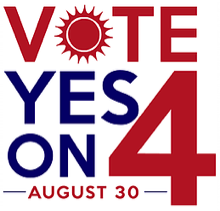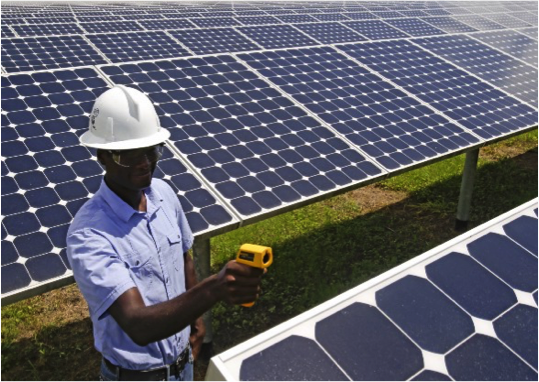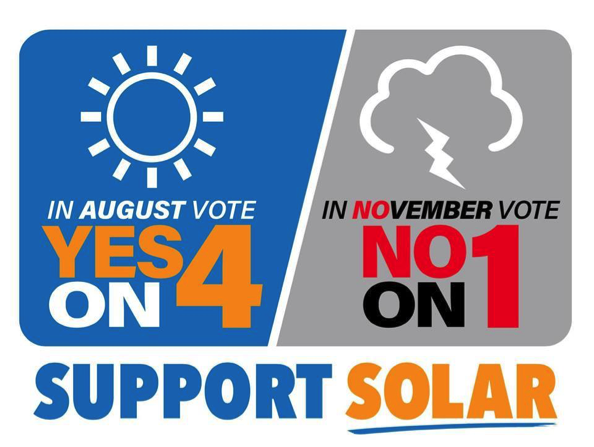A ballot measure approved Tuesday improves the economics of solar in the Sunshine State.
View the original article here.

Orlando Fernandez places a sticker on his shirt after casting his primary vote, Tuesday, Aug. 30, 2016, in Hialeah, Florida. Voters approved a pro-solar measure by 70 percent. CREDIT: AP PHOTO/ALAN DIAZ
Solar advocates finally got a win in the Sunshine State on Tuesday, as voters approved a measure to get rid of property taxes on solar equipment.
With more than 1,970,000 Floridians checking ‘yes,’ the measure, known as Amendment 4, received more support than the state’s two U.S. Senate primary winners, Marco Rubio (R) and Patrick Murphy (D), combined.
It’s not surprising that the measure passed, although the overwhelming support was a morale boost for the industry, which has faced hurdles in Florida. Amendment 4 received 72 percent approval overall — and needed only 60 percent to pass.
“The passage of Amendment 4 is a victory for Florida’s taxpayers and businesses” — Rep. Ray Rodrigues (R)
The amendment was the culmination of a bipartisan effort from the state legislature to make solar more affordable, especially for big box stores and for solar companies that offer leased equipment. While homeowners themselves were already exempt from paying property tax on solar equipment that they owned, businesses were on the hook.
“The passage of Amendment 4 is a victory for Florida’s taxpayers and businesses,” State Rep. Ray Rodrigues (R) said in a statement. “Floridians will benefit from lower taxes, reduced energy costs and the increased security of a diversified energy portfolio.”
Rodrigues cosponsored the bill putting the amendment on the ballot, along with fellow state representatives Lori Berman (D) and Dwight Dudley (D). The amendment had broad support from solar industry groups, environmental groups, and traditional business groups such as the Florida Chamber of Commerce, the Florida Restaurant and Lodging Association, and the Florida Retail Federation. The amendment will now go back to the legislature to be enacted into law.
“With this Florida amendment, the economics of solar have improved.” — Ragan Dickens, Walmart
Supporters are hoping the tax break will spur companies such as Walmart, IKEA, and Costco, which have made massive investments in solar elsewhere in the country, to install solar panels on their Florida stores. It will also allow solar leasing companies such as SolarCity to improve their margins.
“While we don’t have any onsite solar installations at our stores in Florida right now, we’re always looking at opportunities to add solar at stores across the country where it makes economic sense,” said Ragan Dickens, director of sustainability communications for Walmart. “With this Florida amendment, the economics of solar have improved, and we’ll certainly evaluate our opportunities there.”
According to the Solar Energy Industries Association, a Washington, D.C.-based industry group, Florida has the third-most potential for solar in the country, but it is only 14th in amount of installed solar — even while installing 90 percent more solar in the past year. Massachusetts, Colorado, and North Carolina all have more installed solar.
“It’s clear Floridians want better access to affordable, clean energy options and this vote is a significant step in the right direction,” SEIA vice president Sean Gallagher said in a statement. “Now it’s time to keep the momentum going. To ensure a bright solar future for Florida, customers should vote NO on Amendment 1, the anti-solar amendment that will be on Florida ballots this November.”
Amendment 1 was certainly the dark cloud on the horizon during the Tuesday’s Amendment 4 party.
If Amendment 1 passes, it will prohibit Floridians from selling their electricity to third parties. In effect, it would do away with Floridians’ rights to lease solar panels, since, in that situation, the owner of the panels generally sells the electricity to the homeowner. Leasing solar systems has been an effective and popular way to allow homeowners to go solar without paying for the system up front.
Opponents have argued that the measure is designed to limit rooftop solar in Florida, and, as written, is intentionally confusing to voters, who might not understand what they are voting for.
“[Tuesday’s vote] is a big step forward for Florida, removing a longtime barrier to solar adoption, and the wide margin shows voters want rooftop solar,” said Will Craven, a spokesman for SolarCity. “But Amendment 1 in November could be three steps back, as it aims to trick these voters into supporting something that sounds pro solar, but would actually put a thriving solar industry further out of reach. Only monopoly utilities will benefit from a Yes on 1 vote, everyone else will lose.”
The state Supreme Court ruled against that argument in March and allowed the measure to go to voters during the general election.
Amendment 1 will also face a 60 percent threshold for approval, but there is expected to be a significant media campaign encouraging people to vote yes on 1.




